英语高一下册牛津版教学案-03
牛津版高中英语Module3Un...
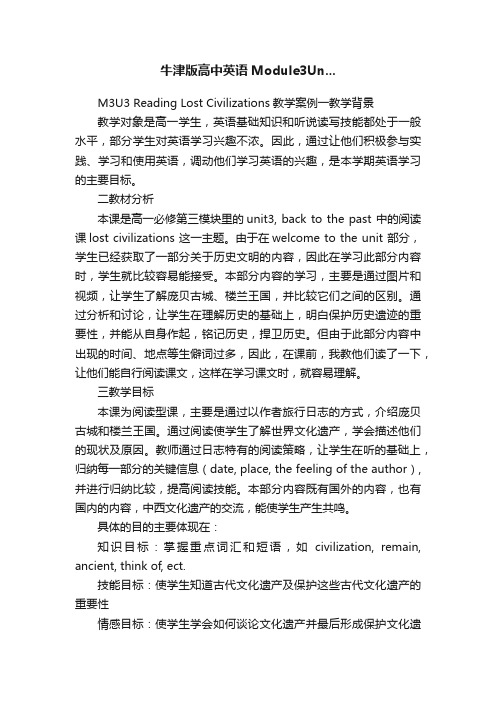
牛津版高中英语Module3Un...M3U3 Reading Lost Civilizations教学案例一教学背景教学对象是高一学生,英语基础知识和听说读写技能都处于一般水平,部分学生对英语学习兴趣不浓。
因此,通过让他们积极参与实践、学习和使用英语,调动他们学习英语的兴趣,是本学期英语学习的主要目标。
二教材分析本课是高一必修第三模块里的unit3, back to the past 中的阅读课lost civilizations 这一主题。
由于在welcome to the unit 部分,学生已经获取了一部分关于历史文明的内容,因此在学习此部分内容时,学生就比较容易能接受。
本部分内容的学习,主要是通过图片和视频,让学生了解庞贝古城、楼兰王国,并比较它们之间的区别。
通过分析和讨论,让学生在理解历史的基础上,明白保护历史遗迹的重要性,并能从自身作起,铭记历史,捍卫历史。
但由于此部分内容中出现的时间、地点等生僻词过多,因此,在课前,我教他们读了一下,让他们能自行阅读课文,这样在学习课文时,就容易理解。
三教学目标本课为阅读型课,主要是通过以作者旅行日志的方式,介绍庞贝古城和楼兰王国。
通过阅读使学生了解世界文化遗产,学会描述他们的现状及原因。
教师通过日志特有的阅读策略,让学生在听的基础上,归纳每一部分的关键信息(date, place, the feeling of the author),并进行归纳比较,提高阅读技能。
本部分内容既有国外的内容,也有国内的内容,中西文化遗产的交流,能使学生产生共鸣。
具体的目的主要体现在:知识目标:掌握重点词汇和短语,如civilization, remain, ancient, think of, ect.技能目标:使学生知道古代文化遗产及保护这些古代文化遗产的重要性情感目标:使学生学会如何谈论文化遗产并最后形成保护文化遗产的意识四教学方法:探究式、任务型阅读、师生互动五教学策略:教学辅助手段:多媒体课件六教学过程:Step 1 presentationTeacher uses the pictures connected with civilizations to lead in.Show some pictures of some famous places教师展示与遗失文明有关的图片来完成导入,这些图片主要是在第一部分中学生已经接触过的,这样,也起到了复习的作用。
高中英语:Unit3 Back to the past教案(牛津译林版必修3)

Unit3 back to the past单元教案Lost civilizations 教学案例一、教学内容:教牛津高中英语必修模块三Unit 3二、课型:阅读课三、教学设计思路Lost civilizations 是一篇有关人类消失的文明的文章。
在教学的设计上,以人类文明这一主线把各项活动贯穿起来。
通过一系列的练习和活动逐步加深学生对文章的掌握和理解,并最终达到综合运用的目的。
笔者力求通过本课的教学使学生了解人类灿烂的古代文明。
引导学生形成珍爱和保护人类文化遗产的观念。
同时掌握阅读日记的技巧,及有关人类文化的相关词汇。
四、教学目标1〕解有关人类灿烂的古代文明,培养热爱人类文明,保护人类悠久文化的感情;2〕会描述历史及事实,会用英文表达情感;3〕使学生掌握阅读日记的技巧,提高阅读能力;4〕掌握有关人类文明的词汇。
五、教学重点、难点1〕培养学生阅读技巧,提高学生阅读能力;2〕培养学生英语语言的综合运用能力。
六、教学过程Step1. Lead-in1.Questions1) China has a long history, in the past thousands of years, Chinese people have built many magnificent structures. Can you name some buildings that could represent ancient civilizations in China?2) Around the world, people also built a lot of magnificent structures. Do you know about them?〔设计说明〕以问题导入,引导学生从熟知的中国文化谈起,并扩展到谈论世界文化,使学生易于接受。
2. Watch the pictures representing ancient civilizations. Introduce these pictures to the students.〔设计说明〕1〕面的内容相衔接。
上海牛津版高一下册英语Unit3 the weird world of plantsgrammar教

aChapter3.The weird world of plants-grammar一、章节分析(一)综述本章节主要语法---形容词和副词的比较结构在牛津英语中出现两次: 本课和高二(上)第二课。
本课主要介绍副词的比较结构;高二(上)第二课主要介绍一些不规则的形容词和副词的比较级和最高级形式, 复习 as…as 结构,并且补充了一些修饰比较结构的副词,如, bit, much,a little, a lot, rather , far 。
故本课不仅要介绍课本上副词的比较机构,还应适量扩展形容词和副词的用法。
(二)目标学习形容词和副词的比较结构。
(三)教学方法口语情景教学法( 教师创设情景,学生主要通过口语训练达到对语言知识的掌握)(四)重点和难点123简单总结一些形容词和副词的比较级和最高级不规则变化形式。
细讲比较结构和句型。
把比较级和最高级结构运用于实际生活中。
4二、教学设计(T eaching Designs ) 教学内容Lead –in教学实施建议 教学资源参考● 让学生找出课文中含有比较结构的句子,分析比较它们的不同 《 华 师 大 一 课 一 点,引出正题:比较级。
●介绍比较级结构的特点。
(见链接 1)Practice ●教师列出学生熟悉的两样或三样以上活动或事物,如:watchingTV/going to the movies; a plane/a train ,a kangar oo and a tortoise等,用比较结构比较两样事物或活动。
●从报纸或杂志上收集一些同类品牌汽车广告、旅游景点等信息,让学生用比较结构分析说明自己的选择,并编一个对话,向朋友推荐该汽车或旅游景点。
练》Exercises and homework 用比较结构翻译句子。
写作:给学生两个选择,如出国留学和在国内大学求学,从几个方面,例如,学费、人文环境、自理能力等比较说明自己的选择。
[链接1]说明:与形容词比较结构有关的语言点知识。
上海牛津版高一下册英语Unit3 the weird world of plantsreading教案S1B
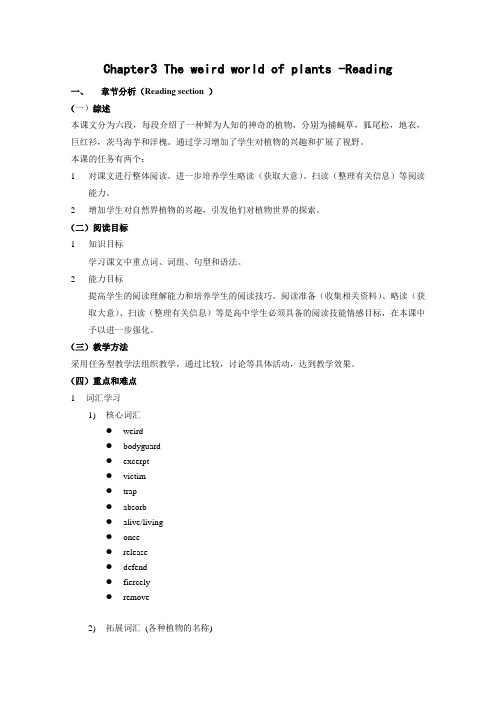
Chapter3 The weird world of plants -Reading一、章节分析(Reading section )(一)综述本课文分为六段,每段介绍了一种鲜为人知的神奇的植物,分别为捕蝇草,狐尾松,地衣,巨红衫,茨马海芋和洋槐。
通过学习增加了学生对植物的兴趣和扩展了视野。
本课的任务有两个:1对课文进行整体阅读。
进一步培养学生略读(获取大意)、扫读(整理有关信息)等阅读能力。
2增加学生对自然界植物的兴趣,引发他们对植物世界的探索。
(二)阅读目标1知识目标学习课文中重点词、词组、句型和语法。
2能力目标提高学生的阅读理解能力和培养学生的阅读技巧。
阅读准备(收集相关资料)、略读(获取大意)、扫读(整理有关信息)等是高中学生必须具备的阅读技能情感目标,在本课中予以进一步强化。
(三)教学方法采用任务型教学法组织教学,通过比较,讨论等具体活动,达到教学效果。
(四)重点和难点1词汇学习1)核心词汇●weird●bodyguard●excerpt●victim●trap●absorb●alive/living●once●release●defend●fiercely●remove2)拓展词汇(各种植物的名称)●Venus fly trap●Bristlecone pine●Lichen plant●Giant redwood●Dead horse arum3)词组和短语●prefer A to B / prefer to do A rather than do B●be trapped●be absorbed in●in weight●provide sb. with sth. / provide sth. for sb.●encourage sb. to do●in return2 句型学习●once…, main clause●as…as …二、教学设计(Teaching Designs)【链接1】Chapter 3 The weird world of plantsI.Lead-in1 A quiz on plants1) In summer we feel cool on the streets when the streets are lines with trees. Three trees can do the job of _____ air-conditioners running all day.A 5B 152) Plants can absorb CO2, and release O2. A man every day breathes in _____ O2, and breathes out _____ CO2.A 750g/1000gB 1000g/750g3) 1.5hectares of trees could produce enough oxygen to keep _____ alive and healthy for a year.A 24B 484) Smell of some flowers and plants can drive off insects.The smell of cucumbers can drive off _____.The smell of onions and tomatoes can drive off _____.The smell of jasmine flowers can drive off _____.A fliesB cockroachesC mosquitoes5) When we touch the leaves of mimosas(含羞草),their leaves will shut. If their leaves shut quickly,it means the weather will be _____.A rainyB sunny2 Ask students to introduce the weird plants in natureII. While-reading1 Skimming:*what are the three plants introduced in the passage?*match the pictures (ask the students to give the key words)2 Words and expressions (用问题引出单词)1) insect n.having an adult stage characterized by three pairs of legs and usually having two pairs of wings. Ask students to give some examples: flies, crickets, mosquitoes, beetles, butterflies, and bees.2) victim n.In which situations, will people be victims?3) trap n. / v.*to catchHunters live by trapping animals.The yellow piece of butter help me to trap the mouse.*a device/means to catcha mouse trapIn the debate, we will design a trap for our opponents and let them fall in.4) absorb v. take inThe sponge will absorb water.You are so clever that you absorb what I teach you.be absorbed in: attractIn your free time, what are you absorbed in? (tell your paterner)5) pollen n. 花粉petal 花瓣6) release v. set freerelease the prisonerrelease the album7) provide sb. with sth. / supply sb. with sth.provide sth. for sb. / supply sth. to sb.What do your parents provide you with?8) in return forIn return for the food which the tree provides them, the ants…In return for what the parents provide you, what will you do?9) defend v. keep safe from any attract or dangerdefend one’s homedefend one’s countrydefend …against …defend one’s reputation10) fiercely adv.adj. fierce*having violent naturea fierce dog (bark at everyone)*violenta fierce storm / competition4 Consolidate wordsHeather, an African flower, produces nectar which attracts sunbirds. The sunbirds have a special beak. They first put its beak into the flower. Don’t worry! It won’t be trapped in the flower. Once they put in the beak, the pollen will fall over. In this way, the flower provides nectar for them. In return, these birds help it pass the pollen. Of course the flower won’t be the victim and it’s not necessary to defend itself.III. Post-readingSuppose you are the Dead horse arum and the fly or the Acacia tree and the ant, make a conversation between them.【链接2】(见The weird world of plants.ppt)【链接3】(见The biggest pumpkin.doc)。
高一牛津英语教案

高一牛津英语教案教案标题:高一牛津英语教案教案概述:本教案旨在为高一学生设计一堂以牛津英语教材为基础的英语课程。
通过本节课的学习,学生将能够提高他们的听、说、读、写四项英语技能,并且能够运用所学知识进行交流和表达。
本教案采用任务型教学法,通过多种教学活动激发学生的学习兴趣和积极性。
教案目标:1. 学生能够准确理解和运用本节课的重点词汇和短语。
2. 学生能够通过听力训练提高他们的听力技能,并能够准确理解听力材料的主要内容。
3. 学生能够通过口语练习提高他们的口语表达能力,并能够运用所学知识进行简单的交流和表达。
4. 学生能够通过阅读理解提高他们的阅读理解能力,并能够理解阅读材料的主要内容和细节。
5. 学生能够通过写作练习提高他们的写作能力,并能够运用所学知识进行简单的写作。
教案步骤:一、导入(5分钟)1. 通过展示一幅图片或播放一段视频引入本节课的主题,激发学生的学习兴趣。
2. 提问学生与主题相关的问题,引导学生思考和讨论。
二、听力训练(15分钟)1. 听一段对话,学生根据听到的内容回答问题。
2. 听一段短文,学生根据听到的内容选择正确的答案。
三、口语练习(15分钟)1. 学生分组进行角色扮演,模拟真实情境进行对话练习。
2. 学生进行小组讨论,分享他们对主题的看法和经验。
四、阅读理解(15分钟)1. 学生阅读一篇短文,回答相关问题。
2. 学生根据短文内容填写表格或完成其他相关任务。
五、写作练习(15分钟)1. 学生根据所学内容写一篇短文,描述他们对主题的看法和经验。
2. 学生互相交换作文,进行修改和改进。
六、总结与反馈(5分钟)1. 教师总结本节课的重点内容和学习方法。
2. 学生进行自我评价,并提出问题和建议。
教案评估:1. 学生听力训练的表现,包括听力材料的理解和问题回答的准确性。
2. 学生口语练习的表现,包括角色扮演和小组讨论的参与度和表达能力。
3. 学生阅读理解的表现,包括对短文的理解和问题回答的准确性。
牛津版的高中英语教案设计5篇

牛津版的高中英语教案设计5篇牛津版的高中英语教案设计1(一) 明确目标1. Get the students to know the importance of body language.2. Train the students integrating skills.(二)整体感知Step 1Show more gestures and let the students guess the meanings. Step 2Read the integrating skills.(三) 教学过程Step 3Introduce Shuang huang.Step 4Work in pairs and make up a funny story.Step 5Practice Writing.(四)总结扩展Step 6Compare the meanings of body language in China and the USA. Meaning in China Body language Meaning in the USAwelcome a smile and a handshake welcomeHello Goodbye ! waving one s hand Hello! Hi! Goodbye!disagreement shaking the head disagreementagreement nodding the head agreementMay I ask a question putting up a hand May I ask a question.love kissing loveno such a gesture keeping ones fingers crassed hoping sth. goodwill happenproud holding up ones head not afraid/proudfeeling sorry for having done hanging ones head feeling sorry for having donefeeling very happy waving ones arm feeling very happydislike, disagreement or pain making a face dislike, disagreementor painIm full/ I v eat stomachache touching ones stomach having a stomachache(五)随堂练习1. Choose the best answers according to the situations.When you meet a foreign guest for the first time, you should say: A. How do you do B. How are youC. Hi!D. Hello! What can I do for you2. Yon are carrying some heavy boxes. Someone comes over to offer help. He may say Can I help you If you need his help, you should say: A. Of course, you can. B. Thats a good idea.C. Yes, go ahead.D. Thanks. Thats very kind of you.3. If you can carry the boxes yourself and don’t need his help,you should say to him:A. No. I don’t need your help.B. Its none of your business.C. No, thanks. I can manage it myself.D. Sorry, you can’t4. When you see an old lady carrying a heavy bag and want to goover to help her, you should say:A. Excuse me, madam. Would you like me to crazy it for youB. Hello! Let me carry the bag for you. It’s too heavy for an oldlady like you.C. Hi, Granny! Let me carry the heavy bag for you. You are old.D. Excuse me. Is there anything else I can do for you2. Choose the right words for the blanks, using the right verb forms.proud juice dining room realize were type comfortable.(1) I hope you feel as __ as you are at home.(2)The speaker ____ to the people in the hall before he left.(3)You’d better make the apples into ____ for your baby; otherwise she can’t eat them.(4) Before you send your article to the publisher, you’dbetter____ it out with a computer or a type-writer.(5)The students neednt go home for lunch, because there is a _____ in the school.(6)I didnt _____ they were a couple (夫妻) until the party was over.(7) She looked so __ at the party that few people talked to her.3. Make gestures and guess what they mean.(1) Raise your hand. (5) Kiss your hand to someone.(2)Put up your hands. (6)Thumbs (大拇指) up.(3)Wave your hand. (7)Thumbs down.(4) Cup your ear. (8) Bite your nails ( 指甲 ).参考答案:1. (1)A (2)D (3)C (4)A2. (1)comfortable (2)waved (3)juice (4)type (5)dining-room(60realize (7)proud3.(1) To ask or answer a question. / To attract attention. / To sayhello.(2)To give up. / To surrender.(3)To say goodbye.(4)To say: I beg your pardon. / Sorry, I can’t hear you.(5)To say Goodbye to a dear friend or relative.(6)To say Great! / Wonderful! / Well done! / Congratulations !(7)To say No good! / Terrible!(8)To mean thinking or “worrying”.牛津版的高中英语教案设计2教学准备教学目标■To help students learn to express attitudes, agreement disagreement and certainty■To help students learn to read the text and learn to writediaries in English■To help students better understand “friendship”■To help students learn to understand and use some important words and expressions■To help students identify examples of Direct Speech Indirect Speech (I): statements and questions in the text教学重难点Wordsupset, ignore, calm, concern, settle, suffer, recover, packExpressionsadd up, calm down, have got to, be concerned about, go through, set down, a series of, on purpose, in order to, at dusk, face to facer, no longer/ not …any longer, suffer from, get/ be tired of, pack (sth.) up, get along with, fall in love, join inPatterns“I don’t want to set down a series of facts in a diary as most people do,” said Anne. →Anne said that she didn’t want to set down a series of facts in a diary as most people do.I stayed awake on purpose until half past eleven……it was the first time in a year and a half that I’d seen the night face to face…教学工具ppt教学过程Hello, everyone. I’m so glad to be your teacher of English. I’d like to make friends with you, to build up a close friendship with you. Today we shall take Unit 1. The topic of this unit is Friendship. What do you think friendship is1. Warming up⑴ Warmi ng up by defining friendshipHello, everyone. I’m so glad to be your teacher of English. I’d like to make friends with you, to build up a close friendship with you. Today we shall take Unit 1. The topic of this unit is Friendship. What do you think friendship isYeah, there are many explanations about friendship. However, friendship is a relationship that can’t be restricted(限制)by definition(定义). It can only be experienced. True friendship can exist between any two souls, be it between people or animals. It can happen at any moment, to anyone. Even to lifeless things, like a diary, a ball, a friendship can happen.Then what is your opinion about friendshipDo you think that friendship is important to our life Why⑵Warming up by learning to sol ve problemsNice to meet you, class. We shall be friends from now on. For everybody needs friends. But being a good friend can sometimes be hard work. Learning how to solve problems in a friendship can make you a better friend and a happier person. Discuss the situation below and try to solve the problems wisely.Common problems among teenagersSolutionSome of the common problems include forgetting friends’ birthday, not keeping promises, letting out friends’ secrets and so on.Maybe we can have a heart-to-heart talk with our friends to ask for forgiveness.Situation 1: Friends get angry with each other when they try totalk about something difficult.Try to understand your friend/ Try to talk about the problem in a different way.Si tuation 2: Friends don’t know how to apologizeStart by telling each other that you are sorry. A simple apology is often enough and is a good starting point.Situation 3: Some friends don’t know how to keep secrets.Keep your secrets to yourselfTips on being a good friendTreat your friends the way you want to be treated. Keep secretsthat are told to you.Pay attention when your friend is talking. Keep your promises. Share things with your friend. Tell your friend the truth. Stick up for your friend.⑶Warming up by doing a surveyGood morning, class. I am your teacher of English. Glad to be here with you. Today we shall take Unit 1 Friendship.To be frankly, I’d like very much to keep a close friendship with you, my dear students, in the following years. How about you then Ok, thanks. I do hope to be your good teacher as well as your helpful friend (良师益友).Now please do the survey on page one.Add up your score according to the scoring sheet on page 8. You don’t have to tell your results. You can just keep it a secret.牛津版的高中英语教案设计3教学准备教学目标Teaching Objectives1. Students are able to learn more about nonverbal humour as well as Charlie Chaplin through network-based.2. Students are able to get the gen eral idea and detailed information of the passage by skimming, scanning as well asinterpreta tion and appreciation.3. Students will learn to face difficulties in life with optimism and humour as well as learn to cooperate with others in groups.教学重难点Teaching difficult points1. How to guide students to search for and sort out related information according to the assigned task through the Internet.2. How to cu ltivate students’ learning ability through teamwork based on network.Teaching important points1. Help students to get the general idea and detailed informationof the text effectively by skimming and scanning.2. Help students to analyze the reasons for Charlie Chaplin’s success by interpreting the key sentences and get them inspired.教学过程Step 1Lead-in(3 mins)1.Students’ Activities:2.The Purpose of ActivitiesStudents are to appreciate a video clip performed by Mr. Bean.Students will be guided to acquire the form of nonverbal humour in a vivid way,thus eage r to learn about the main character of the text with interest.Step 2Network-based Interactive Learning(25 mins)1.Students’ Activities(1).Students are divided into five groups to search for and sorted out the related information according to the assigned task online(2)A representative of each group is to share the information with the others.2.the Purpose of ActivitiesStudents will develop their ability to effectively sort out information on the Internet throug h group cooperation as well asfeel a sense of achievement by their oral presentation.Step3 Text-based Reading(17 mins)Students’ Activities 1. Students are to read the text quickly, and then answer the questions according to the text. 2. Read Paragraph 3 carefully, and then answer the question ---Why did “the littletramp”become Charlie Chaplin’ famous character 3. Read Paragraph 4 and fill in the blanks.4. Find out the sentences that can account for Charlie Chaplin’s success from the text.2.The Purpose of Activities(1)Students will get the general idea as well as the structu re of the text by skimming.(2)Students will get the detailed information and have a deeper understanding of the text.(3) Students will get inspired while analyzing the secret to Charlie Chaplin’s success by interpre ting and appreciating some key sentences in the text.课后习题Step 5 Homework1. Students are to read the text carefully again and underline the phrases and sentences difficult to understand after class.2. Write a summary (about 130 words).牛津版的高中英语教案设计4教学准备教学目标(1)知识目标:让学生通过阅读课文更多地了解我国的农业科学家袁隆平的科研成果及其影响。
牛津上海版高中一年级第二学期Unit3Plants教案(1)(1)
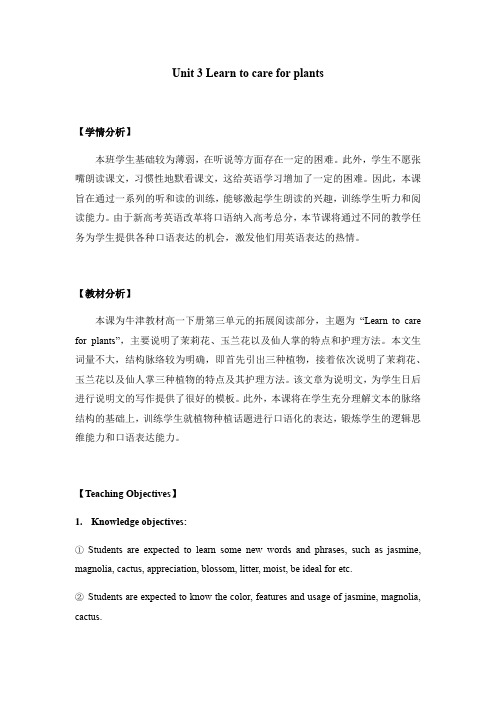
Unit 3 Learn to care for plants【学情分析】本班学生基础较为薄弱,在听说等方面存在一定的困难。
此外,学生不愿张嘴朗读课文,习惯性地默看课文,这给英语学习增加了一定的困难。
因此,本课旨在通过一系列的听和读的训练,能够激起学生朗读的兴趣,训练学生听力和阅读能力。
由于新高考英语改革将口语纳入高考总分,本节课将通过不同的教学任务为学生提供各种口语表达的机会,激发他们用英语表达的热情。
【教材分析】本课为牛津教材高一下册第三单元的拓展阅读部分,主题为“Learn to care for plants”,主要说明了茉莉花、玉兰花以及仙人掌的特点和护理方法。
本文生词量不大,结构脉络较为明确,即首先引出三种植物,接着依次说明了茉莉花、玉兰花以及仙人掌三种植物的特点及其护理方法。
该文章为说明文,为学生日后进行说明文的写作提供了很好的模板。
此外,本课将在学生充分理解文本的脉络结构的基础上,训练学生就植物种植话题进行口语化的表达,锻炼学生的逻辑思维能力和口语表达能力。
【Teaching Objectives】1.Knowledge objectives:①Students are expected to learn some new words and phrases, such as jasmine, magnolia, cactus, appreciation, blossom, litter, moist, be ideal for etc.②Students are expected to know the color, features and usage of jasmine, magnolia, cactus.petent objectives:①Students will be able to improve their skills of listening and reading.②Students will be able to express what they are interested in growing.3.Emotional objective:Students will learn how to grow plants that can decorate their homes and improvetheir sense of beauty.【Teaching Key Points】To learn the features of each plant and some tips about how to grow plants well.【Teaching Difficult Points】To express what kind of plants they are interested in growing.【Teaching Procedures】Steps Teacher’s activities Student’s activities Teaching aimsLead-in Present a multiple-choice andshow some pictures of the fourchoices in the question:What is the city flower ofShanghai?Enjoy the pictures, learnthe word ‘bauhinia’andchose the right answer.To attract student’sinterest and lead in thetopic.Pre- reading Ask a question:How many plants are there inthe passage?Skim the text and answerthe question.To know the name ofthe plants and get arough idea of thepassage.。
牛津高中英语教学设计.doc
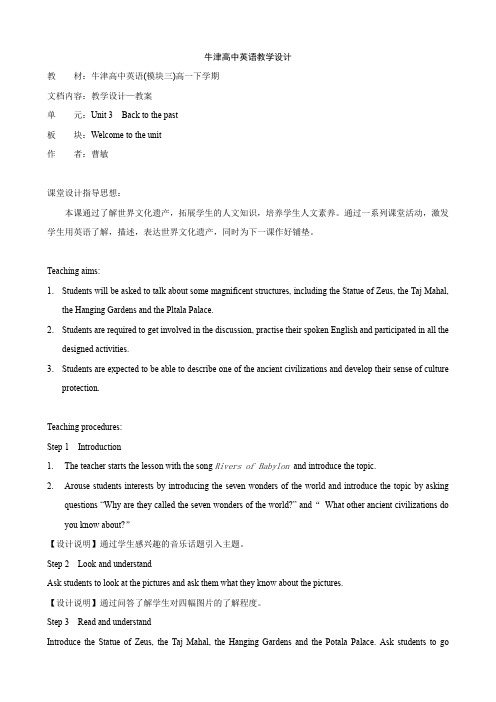
牛津高中英语教学设计教材:牛津高中英语(模块三)高一下学期文档内容:教学设计—教案单元:Unit 3 Back to the past板块:Welcome to the unit作者:曹敏课堂设计指导思想:本课通过了解世界文化遗产,拓展学生的人文知识,培养学生人文素养。
通过一系列课堂活动,激发学生用英语了解,描述,表达世界文化遗产,同时为下一课作好铺垫。
Teaching aims:1.Students will be asked to talk about some magnificent structures, including the Statue of Zeus, the Taj Mahal,the Hanging Gardens and the Pltala Palace.2.Students are required to get involved in the discussion, practise their spoken English and participated in all thedesigned activities.3.Students are expected to be able to describe one of the ancient civilizations and develop their sense of cultureprotection.Teaching procedures:Step 1 Introduction1.The teacher starts the lesson with the song Rivers of Babylon and introduce the topic.2.Arouse students interests by introducing the seven wonders of the world and introduce the topic by askingquestions “Why are they called the seven wonders of the world?” and“What other ancient civilizations do you know about?”【设计说明】通过学生感兴趣的音乐话题引入主题。
译林牛津高一UNIT3整单元教案
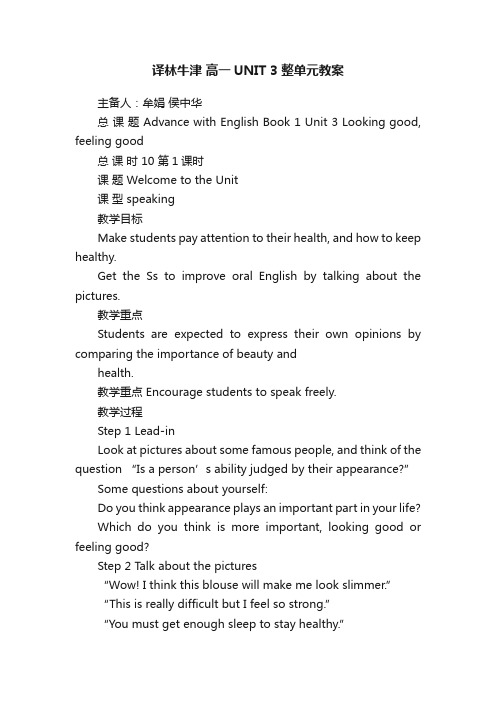
译林牛津高一UNIT 3 整单元教案主备人:牟娟侯中华总课题 Advance with English Book 1 Unit 3 Looking good, feeling good总课时 10 第1课时课题 Welcome to the Unit课型 speaking教学目标Make students pay attention to their health, and how to keep healthy.Get the Ss to improve oral English by talking about the pictures.教学重点Students are expected to express their own opinions by comparing the importance of beauty andhealth.教学重点 Encourage students to speak freely.教学过程Step 1 Lead-inLook at pictures about some famous people, and think of the question “Is a person’s ability judged by their appearance?”Some questions about yourself:Do you think appearance plays an important part in your life?Which do you think is more important, looking good or feeling good?Step 2 Talk about the pictures“Wow! I think this blouse will make me look slimmer.”“This is really difficult but I feel so strong.”“You must get enough sleep to stay healthy.”“Eating more fruit makes me feel better.”Step 3 Discussion:Choose one picture and have a free talk.Who is the person?(2) The reason why he/she does so as the picture shows(3) Give some details about the picture(An example:Jane is a high school student and she is extremely happy, because she has been admitted to university. Tonight her parents will hold a party to celebrate her success and achievements. All their friends and relatives are invited to share her happiness. However, now she is at a loss about the clothes she is going to wear tonight. She is confident about everything except her weight. She always worries about being too fat. At this moment, she has spent at least half an hour selecting clothes without success.)Step4 Talk about questions on P41(1) Do you think we can change our appearance by wearing different clothes?(2) Which do you think is more important, eating well or doing exercises?(3) What do you do to keep yourself looking good and feeling good?Step 5 Further discussion:Looking good Feeling goodAdvantagesDisadvantages总课题 Advance with English Book 1 Unit 3 Looking good, feeling good总课时 10 第2课时 Reading课题 Looking good, feeling good课型 reading教学目标Encourage the Ss to grasp the main topics of the three letters written by two good friends---Amy’s pro blems, how she dealt with it and Zhou Ling’s concerns and advice to Amy.Stimulate the Ss’ interest in learning English by talking about their own opinions when itcomes to the topic “To be beautiful or to be healthy ”.教学重点Understanding the text.教学难点Encourage students to speak freely.教学过程Step 1 Lead-in(1) Some people are overweight, some are a little fat, and some are slim. Find why people are fat.(2) Discuss ways of losing weight.going on a diet b) exercising in the gymc) receiving surgical treatment d) taking weight-loss pills(3) Talk about the advantages, disadvantages & examples of the ways of losing ways.Step 2 Reading comprehension(1) General questions: (1st reading)Where does Amy come from?What kind of pills did Amy take?What caused Amy’s liver to fall?Ex C1 Choose the best answers. (2nd reading)Questions: 1-6Step 3 Further reading(1) Ex C2 Find the main points in the three letters (3rd reading)Subjects Main points1 Dying to be thin2 Recovering3 Re: Recovering(2) Ex D1 D2 Detailed understanding and learning new words in the context.Step 4 Develop reading ability through usage(1) Ex E Complete the letter based on the text.Step 5 Consolidation and Expansion (Choose one of the following.)(1) Suppose you are Amy’s best friend.What advice or suggestions would you give to Amy?(2) Do you think pictures of film stars and models cause young people to worry about their looks? Why or why not?(3) What do you think is the best way to keep healthy? Why?Step 6 HomeworkRead the whole text (1) to know what Amy had to stay slim and how she recovered.总课题 Advance with English Book 1 Unit 3 Looking good, feeling good总课时 10 第3课时课题 Looking good, feeling good课型 language points教学目标Master the usage of some important words and expressions in the play.教学重点 the study of some language points教学难点used to do sth be/ get used to sth/ doing sth work wotthtouching touched教学过程Step 1 RevisionCheck the language usage in the text(1) words & phrases (2) Non-restrictive attributive clauses (3) ‘however/but’ (4) Question tagsStep 2 Language points (Learn and use)1.die-died-dieddead adj. death n.dying adj. 快要死的,快要消失的Nothing can save the dying man.什么都救不了那生命垂危的老人These are dying traditions.这些是即将消失的传统。
牛津译林版英语高一下册Module 3《Unit 2 Language》word教案
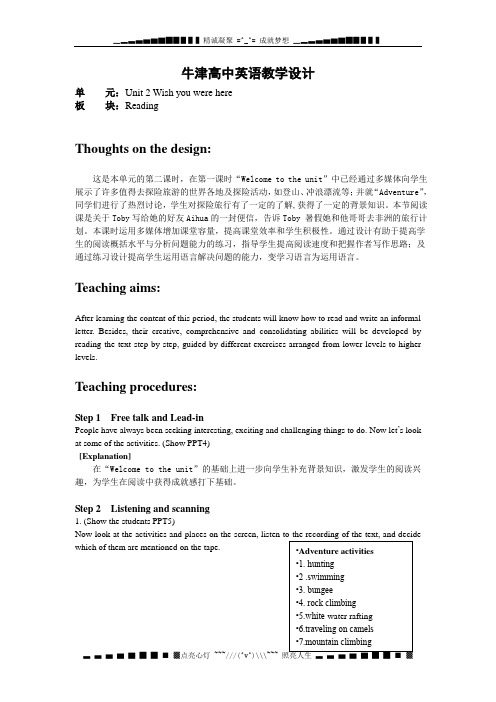
牛津高中英语教学设计单元:Unit 2 Wish you were here板块:ReadingThoughts on the design:这是本单元的第二课时,在第一课时“Welcome to the unit”中已经通过多媒体向学生展示了许多值得去探险旅游的世界各地及探险活动,如登山、冲浪漂流等;并就“Adventure”,同学们进行了热烈讨论,学生对探险旅行有了一定的了解,获得了一定的背景知识。
本节阅读课是关于Toby写给她的好友Aihua的一封便信,告诉Toby 暑假她和他哥哥去非洲的旅行计划。
本课时运用多媒体增加课堂容量,提高课堂效率和学生积极性。
通过设计有助于提高学生的阅读概括水平与分析问题能力的练习,指导学生提高阅读速度和把握作者写作思路;及通过练习设计提高学生运用语言解决问题的能力,变学习语言为运用语言。
Teaching aims:After learning the content of this period, the students will know how to read and write an informal letter. Besides, their creative, comprehensive and consolidating abilities will be developed by reading the text step by step, guided by different exercises arranged from lower levels to higher levels.Teaching procedures:Step 1 Free talk and Lead-inPeople have always been seeking interesting, exciting and challenging things to do. Now let’s look at some of the activities. (Show PPT4)[Explanation]在“Welcome to the unit”的基础上进一步向学生补充背景知识,激发学生的阅读兴趣,为学生在阅读中获得成就感打下基础。
- 1、下载文档前请自行甄别文档内容的完整性,平台不提供额外的编辑、内容补充、找答案等附加服务。
- 2、"仅部分预览"的文档,不可在线预览部分如存在完整性等问题,可反馈申请退款(可完整预览的文档不适用该条件!)。
- 3、如文档侵犯您的权益,请联系客服反馈,我们会尽快为您处理(人工客服工作时间:9:00-18:30)。
英语高一下册牛津版教学案-03年级高一学科英语执教流水号20170203学习要求:Learntheusageofsomewordsandphrasesinthereading.知识梳理:1.L7.Onceoutinthestreet,shewalkedtowards….bus.1.一旦出版,这本词典会特别畅销。
Once__________,thisdictionarywillbeverypopular.2.一旦被抓,他会受到惩罚。
Once_________,hewillbepunished.3.When________,itisofgreathelptolearnsomeskills.A.readingB.readC.toreadD.studentsread4.When________(tell)thetruth,helosthismind.5.Unless_______(make)themostof,timewillnotbeenough.2.(L31)Pollyfoundherselfstaringupatamanstandingwithhishandrestingonherarm.With+O+O.C.Hestoodtherewithhiseyes________(look)atthedog.Theguyenteredtheroomwithhishands________(tie)back.Withtoomuchwork________(do),shecan’thelpdothehousework.Withtheletter_________(type),thebosswalkedtothesecretary.Sheslepttherewiththewindow_______(open).Wearehavingalesson_________________(教室里有一只猫)3.L10Thetruthisthatthefogistoothickforthebustorun that far.L53Afog this badisrare.L14Shesensed that shewasbeingwatchedbyatallman.L33Theface that shesawwas that ofanoldman.1〕Itwasinthelab______wasbuildthreeyearsago_____thestudentsmadetheexperiment.A.that;whereB.which;thatC.what;thatD.which;where4.TheTallmanwasnowheretobeseen.“nowhere”为否定副词,”tobeseen”为主语不足语,补充说明主语的情况。
Wecouldfindhimnowhere.Nowhere________findhim.Theboyisnowheretobefound.Wehavenowheretofindthelostboy.1.Theycouldfindnoroom__________.(livein)2.Theyhavenofood__________.(eat)3.Peopleusedtohavecleanwater________.(drink)4.Thereisnocleanwater______________________.5.Cleanwaterisnowhere_____________.(find)5.L24.Shecouldfeelherheartbeatingwithfear.“with”means“becauseof”e.g.Shetrembledwithhorror.Herfaceturnedredwithanger.Shewasfrozenwithfear.6.beat;strike;hitbeat:有规律有节奏地拍打strike:(钟)敲;划〔火柴〕;〔灾害,疾病〕袭击hit:打;击hitsbonthe(partofthebody)1.Thewaveswere________ontheshore.2.Theclockhasjust________3o’clock.3.Theareawas_______bybirdflu.4.She_____himontheheadwithabook.5.Itisfreezingcoldinhere.______amatchandmakeafire.7.calm,quiet,still,silent1.Parentsasktheirchildrentokeep________.2.Shekept_______aboutwhatshehadseeninthetrafficaccident.3.Fearheldher______.4.Whenrunningintodanger,keeping__________isofgreatimportance.8.except,beside,besidesbesides:除……之外,尚有或者还有…except与but:除……之外,表示不包括在内but通常与否定词和不定代词连用,all,nobody,everywhere,who Therewillbefivemoretoattendthemeeting,______John.Nobody_____youcouldbesoselfish.Everyoneisthere_______Tom.It’sapitythatweallwenttotheparty______Tom.except将一个或几个人或物从同一类或一般的种类中除外,后跟名词、代词、副词、介词短语。
exceptfor:整体中的部分;性质不同exceptthat–clauseexceptwh-clauseexceptprep.Phrasesforhisbadtemper/thatthereissomespellingmistakes/whenitisverycold/behindthedoor1.Isearchedeverywhereformybookexcept________.2.Heisagoodteacherexcept__________.3.Yourarticleisgoodexcept____________.4.Theplantsgrowquicklyexcept____________.9.senseShesensedthatshewasbeingwatchedbyatallman…Shehadasensethatshewasbeingwatchedbyatallman..Peoplehavefivesenses.asenseofhumor,senseoftime,the6thsensethesenseofsight/hearing/touch/smell/tastemakesense:haveaunderstandablemeaningmakesenseof:understandmakenosense:meaninglessThereisnosensein…:Thereisnomeaningin…inasense:在某种意义上tosomedegree/extentinnosense:决不是,绝非1〕.Idon’tagreewithyou,eventhoughwhatyousayis_______true.A.innosenseB.ineverysenseC.inasenseD.inallsenses2〕这句话毫无意义。
Thissentencedoesn’t_________________.3〕.你能弄懂这份电报的意思吗?Canyou_________________thistelegram?WhenI________heislyingtome.Iaskedhim,“Canyou______________theschoolrules?Ifyouthinktheyreally____________inasense ,_________________________lyingtoyourteachers,thatistosay,____________couldyo uhavecheatedme!”Idon’tappreciateyour______ofhumor.10.observeobservesb/sthobservesbdosth/sbbeobservedtodosthobservesbdoingsth/sbbeobserveddoingsthobservesbthat-clause/wh-clause完成以下句子的英文翻译:1)你注意到他话里有什么惊奇的地方了吗?_______________________________inherwords?2)我没有注意到外面下那么大的雪。
Ididn’t________________________________________________.3)他看见一个男人在马路对面走着。
________________________ontheoppositesideoftheroad.4)他注意到了他们之间发生的情况。
He______________wasgoingonbetweenthem.5)他不明白有人看见他上楼了。
Hedidn’tknowhe_______________goupstairsbysomeone.Hedidn’tknowsomeoneobservedhim___upstairs.11.sightcatchsightof/insight/outofsight/losesightof/atfirstsight1.Onlyromanticpeoplebelievepeoplefallinlove________.2._________,outofmind.3.He________herbeforeshedisappearedinthecrowd.4.Therewasnobody_______inthestreetsothathecouldturntonobodyforhelp.5.Graduallywe________land.Ourheartbeatwithfear.导学检测:选词填空。
relate…to…stareatreachoutinthedistance haveaglanceatroughoutofsightmakesensewithinwalkingdistanceobserveTotellyouthetruth1.________,Iwatchedanexcitinghorseraceyesterday.That’swhyIwasabsentfromwork.2.---Howfaristhedistancefromtheretothebeach?---Notfar,______.3.Hetriedto__________fortheappleonthetree,butfailed.4.Hewasveryshyand__________thevisitor.5.Sandydidn’tleaveuntilthetrainwas_________.6.Thefallinthecostoflivingisdirectly_______thedropintheoilprice.7.Herhandswere_________withhardwork.8.Ispentsometime____________theircustoms.9.Thissentencedoesn’t__________.Makeanotherone.10.Parentsalwaystelltheirchildrenthatit’simpoliteto________others.巩固训练:1.Afterwritingmanycompositions,thestudentsfelta______ofachievementintheirwritingability.A.potentialckC.gloryD.sense2.Doyouhaveenoughto_______allyourdailyexpenses?A.coverB.spendC.fillD.ofter3.Sometimesitwasabitboringtoworktherebecausetherewasn’talways_______muchtodo.A.suchB.thatC.moreD.very4.IknowthatthanksgivingDay______onthelastThursdayofNovember.Couldyoutellmehowyouusually_______itinyourcountry?A.rests;congratulateB.places;remindC.bids;rememberD.falls;observe5.He_______hiswatchandleftinahurry.A.glancesatB.watchedC.staredatD.glancedat6.Theinstructionsonthebottlearevery_______.Noonecanunderstandthem.A.confusedB.confusingC.interestedD.interesting7.Heistiredofdoingthesamethingeveryday.He______achancetodosomethingdifferent.A.looksforwardB.looksatC.wishesforD.putsforward8.Whenthey_______thehouse,adograntowardsthem.A.approachedB.walkedC.ranD.stepped课后作业题源:问题统计与分析。
